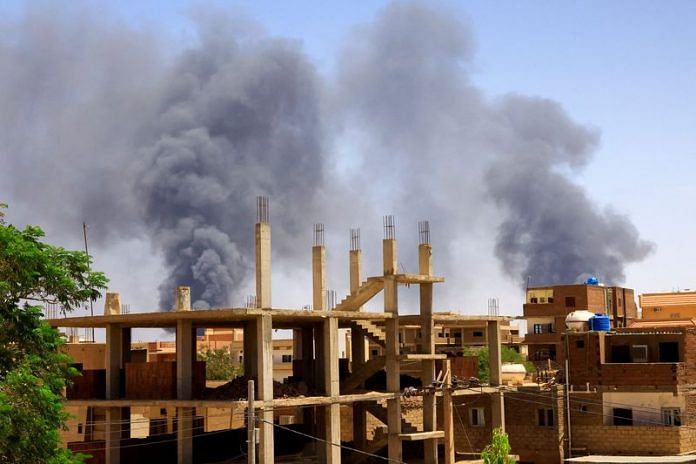By Khalid Abdelaziz and Nafisa Eltahir
PORT SUDAN, Sudan (Reuters) -Heavy gunfire echoed around Khartoum on Friday as civilians trapped in the Sudanese capital said the army and rival paramilitary were fighting without regard to their plight.
Battles since mid-April have killed hundreds and wounded thousands, disrupted aid supplies, sent 100,000 refugees fleeing abroad and turned residential areas of Khartoum into war zones.
“It’s been four days without electricity and our situation is difficult,” said 48-year-old Othman Hassan from the southern outskirts of the city. “We are the victims of a war that we aren’t a part of. No one cares about the citizen.”
Smoke rose into the air in an area outside Khartoum’s presidential palace and across the River Nile in the adjoining city of Bahri, live footage on broadcaster Al Jazeera showed.
Despite multiple ceasefire declarations, the army and the paramilitary Rapid Support Forces (RSF) appeared to be fighting for territory ahead of proposed talks.
So far, army leader Abdel Fattah al-Burhan, a career military officer, and RSF commander Mohamed Hamdan Dagalo, a former militia leader known as Hemedti who comes from the strife-torn western region of Darfur, have shown little public willingness to negotiate.
Their power struggle risks dragging in outside powers, further destabilising an already restive region.
A group of countries led by Britain, the United States, Germany and Norway is set to request an urgent meeting of the U.N. Human Rights Council on the Sudan crisis next week, a document showed on Friday.
Across swathes of Khartoum, factories, banks and shops have been looted or damaged, power and water supplies have been failing and residents have reported steep price rises and shortages of basic goods.
Whole neighbourhoods have emptied out, leading people to fear for the houses they left behind.
Aya Eltahir said she fled with her family to the northern outskirts of the capital after bullets hit their roof.
“I make plans to return every day, even just to grab more essential items, but the situation is too unsafe,” she said.
The World Health Organization (WHO) said at least 551 civilians had died and 4,926 been wounded, based on data from Sudan, but real tolls were likely much higher due to the difficulty of accessing medical facilities.
‘RECKLESS DISREGARD’ FOR CIVILIANS
The Sudanese Doctors Union said one of the country’s main maternity hospitals, Aldayat, in the city of Omdurman that adjoins Khartoum, and the central medical supply warehouse had been looted and occupied by forces on Thursday.
In total, it said 17 hospitals had been damaged by fighting and 20 forcibly evacuated since the start of the violence. Sixty of the 88 hospitals in Khartoum are out of service, it said, with many of the rest only offering partial service.
“Sudan’s warring armies are showing reckless disregard for civilian lives by using inaccurate weapons in populated urban areas,” Human Rights Watch Sudan researcher Mohamed Osman said in a report.
The army and RSF, who had shared power after a coup in 2021, have accused each other of breaching a string of truces.
Their conflict has derailed an internationally-backed plan to usher in democracy and civilian rule after a 2019 popular uprising that unseated Islamist strongman Omar al-Bashir.
The U.N. has pressed the warring sides to guarantee safe passage of aid after six of its trucks were looted.
The U.N. World Food Programme (WFP) says some $14 million worth of food for the needy had been plundered, while U.N. children’s agency UNICEF said cold chain storages had been looted with more than 1 million polio vaccines destroyed.
Fighting has spread across the country, including the western region of Darfur.
The U.N. refugee agency UNHCR is estimating an exodus of 860,000 people from Sudan and called on governments to look kindly on fleeing civilians.
“We’re advising governments not to return people to Sudan,” Elizabeth Tan, UNHCR’s director of international protection, told reporters at a briefing in Geneva.
The UNHCR said more than 56,000 people had entered Egypt through the Qostol and Agreen crossings since May 4, including at least 52,500 Sudanese, according to figures from Egypt’s foreign ministry.
“The humanitarian situation in and around Sudan is tragic – there are food, water and fuel shortages, limited access to transport, communications and electricity, and sky-rocketing prices of basic items,” said Raouf Mazou, UNHCR’s assistant high commissioner for operations.
(Additional reporting by Emma Farge and Gabrielle Tétrault-Farbe in Geneva, Adam Makary, Jana Choukeir and Ahmed Elimam in Dubai; Writing by Michael Georgy; Editing by Andrew Heavens and Andrew Cawthorne)
Disclaimer: This report is auto generated from the Reuters news service. ThePrint holds no responsibilty for its content.



